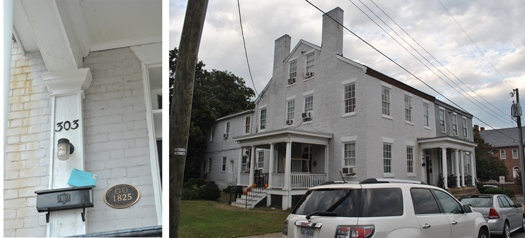Editor’s note – This excerpt was provided by John Hennessey and depicts the house where the Rev. Alfred Randolph lived, St. George’s rectory at 303 Hanover.

Sunday, December 14th.
“I slept last night in a large parlor of one of the finest private residences in the city. There are two handsome rosewood pianos in the room, one of them made by Stodart of London, the other by Andrea Stein of Vienna. I slept on the top of the latter, using the piano cover as a bed; it was not very soft, but the bedstead was magnificent, and I can recommend those who cannot afford common bedsteads to use pianos-they are equally convenient. The house belongs to the Reverend Alfred Randolph, Episcopal clergyman who is a rebel, as one of his darkies who came to the house while we occupied it told us chat he refused to pray for the President of the U.S. in church, as all good Episcopalians are expected to do. The sofas and floor of the room were covered with our wounded, and from midnight till daylight everything was quiet and all slept soundly, but at the first dawn of day firing again commenced, and I made a couple of narrow escapes. A rebel shell passed so close to me that I could see its shape distinctly and feel the motion of the air; it dashed through a fence not two feet off, thence through another, and striking the sidewalk, plowed a deep furrow, and bounding off, exploded in the air, scattering the pieces all around. Another one struck an ailanthus tree a few feet above my head, tearing it to pieces, and then, bursting, hurled its iron fragments all about me. Many others; also solid shot and grape whistled by within a few feet, but fortunately I did not receive a scratch. I have been engaged this morning hunting up our wounded, many of whom were taken to the hospitals of other regiments. Our loss is frightful; the 81st is done for as a regiment. Our whole effective force that went into battle was about 250, the regiment having been so much reduced by previous battles and sickness, and now we have lost more than half of chose. There has been no regular engagement today, but volleys of musketry and heavy guns are heard at intervals, and occasionally a shell strikes some building nearby or sweeps down the street, clearing a passage for itself through whatever may oppose it. We found some fat chickens in a coop in the yard of our premises, flour, etc. in the pantry, and potatoes in the cellar, so we made out a tolerable Sunday dinner for soldiers. Our table was laid with a white cloth, plates, dishes, knives, forks, and spoons belonging to the Reverend absentee, but the best of the joke was that after the dinner had been eaten and plates and dishes piled in a corner for the family to wash on their return, and our cooks had just set the cable with a clean set from the cupboard for tea, when in walked our chaplain with two brother clergymen, whom he had invited to dine with him. It appears that he had given orders to have the chickens cooked for himself and friends and was rather astonished and mortified to find that we had stolen a march on him and appropriated his dinner to ourselves. So they had to content themselves with slapjacks and molasses and a cup of coffee. Some of the men a day or two ago, in ransacking a drugstore, came across a large jar of what they supposed to be lard. They divided it and started off in various directions for the purpose of frying slapjacks, as flour was abundant. What must have been their disgust when they found that instead of lard they had cooked their cakes in simple cerate.”
From Michael A. Flannery and Katherine H. Oomens, eds, Well Satisfied with My Position: The Civil War Journals of Spener Bonsall (Carbondale, So. Ill. University Press, 2007). Bonsall was hospital steward. 81st Pennsylvania
